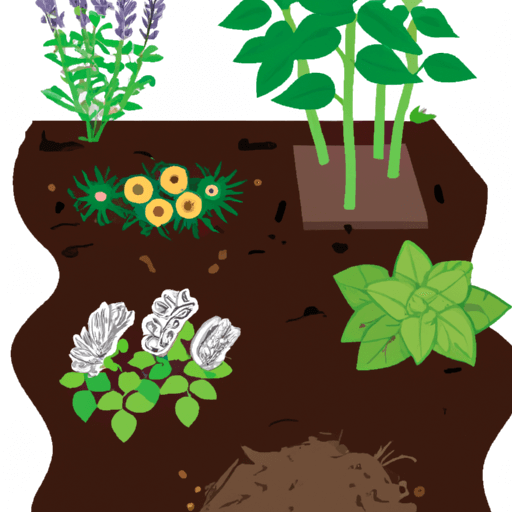Coffee grounds have long been recognized for their numerous benefits in gardening. They provide plants with essential nitrogen, enhance nutrient content in compost piles, and increase soil acidity, which is advantageous for acid-loving plants.
Not only that, coffee grounds attract worms, making them ideal for vermicomposting. Additionally, they act as a natural deterrent for pests like slugs and ants.
However, it is crucial to use coffee grounds judiciously, as overwatering can have adverse effects on plant health. By understanding the right usage and plant preferences, coffee grounds can significantly boost plant growth and repel pests in a garden.
The Benefits of Coffee Grounds for Plant Growth
Coffee grounds provide essential nutrients and increase soil acidity, benefiting plants that thrive in acidic conditions.
As a sustainable gardening solution, coffee grounds are rich in nitrogen, which is a crucial nutrient for plant growth. Nitrogen promotes leaf and stem development, as well as overall vigor.
Additionally, coffee grounds can be added to compost piles, enhancing the nutrient content and improving soil quality. The science behind coffee grounds’ impact on plant growth lies in their ability to release nitrogen slowly over time, providing a steady supply of this essential nutrient to plants.
Furthermore, the increased acidity of the soil due to coffee grounds creates an environment that is favorable for acid-loving plants such as azaleas and blueberries.
Overall, utilizing coffee grounds in gardening practices not only provides plants with valuable nutrients but also contributes to sustainable and environmentally-friendly practices.
How to Use Coffee Grounds to Repel Pests
Using coffee grounds can help keep unwanted insects and critters away from the garden. Coffee grounds act as a natural pesticide, repelling pests like slugs and ants. This is due to the strong scent of coffee, which insects find unpleasant. Additionally, coffee grounds can be used as a physical barrier when sprinkled around plants, preventing pests from accessing them. The table below provides a list of common garden pests and how coffee grounds can help control them.
| Pest | How coffee grounds help |
|---|---|
| Slugs | Repels slugs and creates a barrier |
| Ants | Repels ants and disrupts their trails |
| Caterpillars | Acts as a deterrent |
| Aphids | Reduces aphid populations |
Watering Plants With Coffee: Dos and Don’ts
Watering plants with coffee should be done in moderation to avoid negative effects on plant health. While coffee grounds can provide nitrogen and increase soil acidity, overwatering with coffee can lead to yellowing foliage and browning leaf tips.
It is recommended to water plants with coffee once a week and adjust the watering schedule based on how well plants respond. If plants show signs of acidity overload, reducing the frequency of coffee watering is advised. Diluting leftover liquid coffee with water is essential to avoid overwhelming plants, and it can also be used to hydrate dry compost piles.
However, there are alternatives to watering plants with coffee. Sprinkling coffee grounds directly on the soil, using diluted coffee, or using used tea leaves can also provide plants with additional nutrients and improve soil quality. It is important to research the specific needs of each plant before using coffee as a fertilizer.
Maximizing the Use of Leftover Coffee for Plants
To maximize the use of leftover coffee for plants, it is recommended to dilute the liquid with water before application. This helps prevent overwhelming the plants with strong coffee. Diluted coffee can provide additional nutrients and hydration to the plants.
Here are some creative ways to recycle coffee grounds in gardening:
-
Using coffee grounds as a natural pesticide: Coffee grounds can act as a deterrent for pests like slugs and ants. Sprinkling coffee grounds around plants can help keep these pests away.
-
Adding coffee grounds to compost piles: Coffee grounds can enhance the nutrient content of compost piles. They provide nitrogen and attract worms, making them beneficial for vermicomposting.
-
Using coffee grounds to improve soil quality: Coffee grounds can be directly sprinkled on the soil around plants. They act as a natural fertilizer and improve soil quality for many plants.
-
Using coffee grounds to deter cats: Coffee grounds can be used to deter cats from entering the garden. They can be sprinkled around the garden to keep cats away.
Choosing the Right Plants for Coffee Ground Fertilization
Azaleas and blueberries are examples of plants that benefit from the fertilizer properties of coffee. When choosing suitable plants for coffee ground fertilization, it is important to consider their compatibility with coffee grounds.
Acid-loving plants like azaleas and blueberries thrive when coffee is used as a fertilizer, as it increases the acidity of the soil. However, not all plants are suitable for coffee ground fertilization. Tomatoes and lavender, for instance, prefer neutral to slightly alkaline soil and may not benefit from coffee as a fertilizer.
It is essential to research the specific needs of each plant before using coffee grounds. If coffee is not suitable for a particular plant, there are alternatives such as using other organic fertilizers or composting coffee grounds separately.
Optimizing coffee as a fertilizer involves understanding the soil preferences of plants and making informed choices. By following coffee ground gardening tips, gardeners can enhance plant growth and promote a healthy garden ecosystem.
Frequently Asked Questions
Can Coffee Grounds Be Used as a Natural Weed Killer in the Garden?
Coffee grounds can be used as a natural herbicide in the garden. Their high nitrogen content inhibits weed growth. Additionally, coffee grounds act as a soil amendment, improving soil structure and nutrient availability for plants.
Are There Any Plants That Should Not Be Watered With Coffee?
Some plants, like tomatoes and lavender, may not benefit from being watered with coffee. Alternatives to using coffee grounds as fertilizer include other organic materials like compost or specific plant-specific fertilizers.
How Long Does It Take for Coffee Grounds to Break Down in the Soil?
Coffee grounds decomposition and composting times vary based on factors like temperature, moisture, and the size of the grounds. On average, it takes around 2-6 months for coffee grounds to fully break down in the soil and become beneficial compost for plants.
Can Coffee Grounds Be Used to Deter Slugs and Snails in the Garden?
Coffee grounds can be used to deter slugs and snails in the garden. They also serve as a fertilizer and compost accelerator, providing nutrients to plants and enhancing the nutrient content of compost piles.
Can Coffee Grounds Be Used as a Mulch Around Plants?
Yes, coffee grounds can be used as a mulch around plants. They act as a natural fertilizer, providing nutrients to the soil. Additionally, coffee grounds can improve soil quality and help retain moisture.







